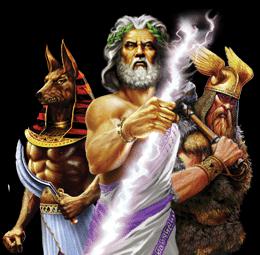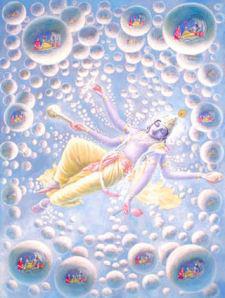
orientalism at its finest
Hello lovely readers, hope you are all enjoying your Thanksgiving break

So, in case you haven’t read my post Sita Sings the Blues, you should maybe take a peek at it real quick since it prefaces the following discussion. Or not.
The goal of this post is to scratch the surface of a very complex topic: defining and molding Hinduism in the context of an increasingly monotheistic world. This context is a relevant one, I believe, in that Hinduism would have evolved differently if, for example, Greek polytheism was the dominant world religion as opposed to Christianity. Perhaps Hindus would then be less hell-bent over persuading their peers that their religion is not polytheistic?

polytheism is obviously more fictitious than monotheism
Is Hinduism a polytheistic religion? Simply put, no. Are there Hindus that are polytheists, yes. Does that mean that they are more ignorant of the ultimate reality than someone who believes in a singular ultimate reality? Perhaps not. The thing is, Hindus have been conditioned to steer away from that oh so awful word. Polytheist. Pagan. Infidel. All attacks that are hurtful given the context of the attacker. No, no, we’re not like those people that believe in a million Gods. That’s silly, we obviously don’t believe that. No, seriously, we can be friends, we’re not so different. (This appears to be a goal of some Hindu apologists like Ram Mohan Roy, who we can associate with the Brahmo Samaj and the Bengal Renaissance. Bah! I’m going to have to write a separate post on Apologetics and Ram Mohan Roy.)
Anyway, here’s the reality. You’re doing a disservice to the pluralistic nature of the Hinduism that many Hindus boast about. There is no room for judgment of others’ religiousness or spirituality in Hinduism–mind your own damn business, you don’t know their stories. What’s the use of boasting pluralism when it doesn’t translate into love and compassion and understanding for all? Why do practitioners of religion love to boast of facets of their religion that they personally don’t employ? Isn’t Hinduism awesome? It’s not just tolerant, it’s actually respectful of other religions and even goes as far as absorbing them into the fold! Yeah, except how does that really play out in the life of the average Hindu? How respectful are you of people of other faiths when they slander yours?
I know I’ve failed that test as a Hindu many a time in the past. Sometimes you can’t prevent yourself from thinking, “What kind of jerkoff parents teach their children intolerance? What gives this person the right to scoff at my beliefs? What kind of God disadvantages his children by sending them into this world where they might not even hear of the one and only path that leads to him and find the “true religion”? NOT A GOD I BELIEVE IN!”
Before you know it, you’re just as disrespectful and uppity as the next religious zealot. You’re part of this “competitive intolerance” where in order to combat a jerk, you act out of defensiveness and stoop to his level. You become as intolerant and disrespectful as your opponent because you don’t know how else to defend yourself. It quickly becomes a battle of “my religion is better than yours”.
And who is to say that pluralism is high and mighty? *cough* me *cough*
But seriously, how does a Hindu respect other views while still trusting the veracity of his own? Complex, variable, and numerous answers. I can only answer from a personal standpoint. Here is how I deal:
1) Hinduism favors diversity. Fact. Many individual flavors of Hinduism also favor evolution of thought; some Hindus consider Buddhism to be an evolved branch of Hinduism that is still technically Hinduism. This resonates with me as a Hindu, but I’m pretty sure this would make no Buddhist happy. Diversity in thought, people, organisms–it’s a defining quality of our universe that is favored in all realms. The single succession of any organism, belief, whatever, will not happen. It’s like a natural law that no phenomenon, scientific or social, can escape. Imagine what would happen if one religion was “proved” to be true one day. All we have are beliefs, and that’s for a good reason. There are enough religious zealots that lose it over beliefs that they treat like facts–what if we knew beyond doubt that one religion had it right all along?
2) There’s something about exclusivity that gets people off. People like believing that they are God’s chosen people. People like believing that certain actions and beliefs will put them in good standing with their creator. People like believing that they and others in their community of like-minded individuals have access to some knowledge that others do not. It makes them special. I see it in scientists as well as religious nuts. What does it mean? Not sure. I like to think it’s about knowledge. About finding something that resonates, sticking with it, and truly believing that you’ve found something meaningful. A treasure that no one can take away from you. And in a way, it is special, because you’re seeing it as you, and that singular experience of a thought or belief is unique. And people who have similar experiences with that very thought or belief are of course people you would be drawn to. What you need to recognize as a Hindu, though, is that there are millions upon millions of experiences like these–and over many different thoughts and beliefs. They stem from the inherent diversity of our universe that is a product of all the interactions (stochastic and otherwise) within it. Not one religion can account for all the spiritual enlightenment in the world. Not one religion can claim that its influences have been positive across the board and for each individual it has affected. As a Hindu you must respect the capacity of different paths to lead to the same light.

i just really love this image
3) Remember that snide remarks from a jerk are reflective of jerkishness, not the jerk’s religion. Common sense advice that becomes harder to take when the sample size of jerks from a particular religious group is suspiciously large. I’ll be honest, I really wonder what people learn at Sunday school sometimes… I just gotta refer myself to point number 2. People love exclusivity and the notion that they are more special to God than someone who might ascribe to different worldly labels. Whatever helps you sleep at night, I guess. Is this condescending and uppity in itself? Depends. The value of exclusivity is a discussion for another day. But I see no merit to the idea that one religion–ultimately a product of man, especially given all the tampering that we do–trumps the others, universally. I think people would be better off if they stopped worshiping their religions and started worshiping God, if worship is what they seek. And I do not think this is a uniquely Hindu thought in any way. Which leads me to my last thought.
4) If our universe was to be destroyed and started from scratch–as I believe as a Hindu–things would evolve similarly and all the things we once had would be created once more. Our eyes would still evolve to be on the front of our faces and not on our feet. Language would be developed. Someone would invent zero. The internet or something similar would be introduced and would revolutionize the world. We would have a spectrum of belief systems which included everything from polytheism to devil worship to obscure cults to monotheism to atheism to agnosticism. Religious beliefs that stick often have a basis in rational thoughts or responses to common and rare life events. An understanding of Hindu philosophy is not dependent on mastery of a particular scripture and would be borne of human thought without need for a specific human messenger or the transmission of a particular text. Maybe you’re Hindu and you didn’t know it. Anyone heard of the Art of Living classes? Secular spirituality. I’m diggin it. Whether its a byproduct of Hindu thought or something to be absorbed, you tell me.

whatchu know bout that multiverse?
5) There will always be people who snicker at our “backwards” culture and will never appreciate the many sophisticated trains of thought within Hinduism, and that’s okay. I’m convinced that Thai culture might be the only one out that doesn’t reject Hindu culture as something backwards. The Ramayana was a hit in Thailand. Meanwhile, people reject yoga as a practice of heathens. And if they do yoga, God forbid they allow it to be traced back to Hindu culture. No, no, yoga transcends religion and geography. Yeah, we were doing yoga before the Hindus. Okay, fine, we can maybe call it Buddhist, because at least Buddhism is more marketable and “New Age”. I don’t see the need for Hindus to get “credit” for anything. I do, however, find it a bit ridiculous that there is this need to deny any possible connection between something of utility, like yoga or select Ayurvedic concepts, to Hinduism or Hindu culture. Ugh, gross, why would we ever borrow something from those people? Well, suck it. You start your day with hatha yoga? You’re practicing Hinduism, b*tch.
Kidding.
Happy Thanksgiving!

